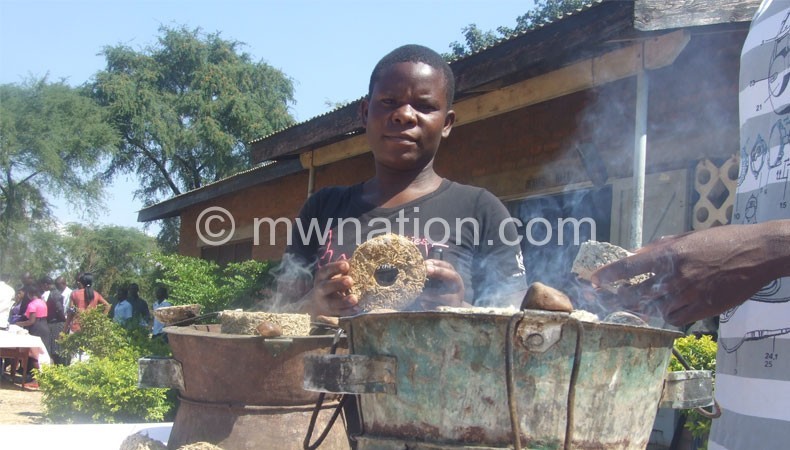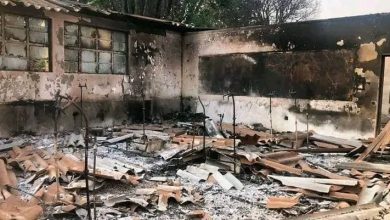Ending poverty 6 000 briquettes at a time

Unemployment is not an inability. Karonga Youth Entrepreneurs (Kaye) have risen to this song less sung, ready to tap the opportunities widespread mountains of rice husks in the district’s rice mills present.
“Our goal is to create job creators, not job-seekers,” says Kaye leader John Ndaki Banda.
Founded last year, the 120-strong group has hatched a briquette-making business plan which promises to make Karonga cleaner while freeing the jobless from poverty.
Their business line looks stark: soaking husks, grass, sawdust, maize stalks, leaves and pieces of paper; crashing the organic litter and moulding compacted tyre-like alternatives for firewood and charcoal.
A path less taken, Kaye recently engaged Technical, Entrepreneurial and Vocational Education and Training Authority (Teveta) and Malawi Industrial Research and Technology Development Centre (MIRTDC) to train youths on how to make burning bricks often used for domestic cooking.
In their mind, Banda and company see the business changing their lives a briquette at a time.
”We’ll begin by producing 6 000 briquettes every day, amounting to K300 000 a week,” says Banda.
Charity Mbunge, one of the 20 members trained by the Tevet Authority, believes the business presents a decent and safe income generating activity at a time the district’s young population is venturing into transactional sex—a recipe for sexually transmitted infections, including HIV and Aids—due to lack of skills and jobs.
“The training is an eye-opener. We’ll harness the skills acquired to transform ourselves, for an idle mind is the devil’s workshop,” says Mbunge.
To the young entrepreneurs, the briquette-making business kick-starts the rise of a K45 million dream empire comprising construction of workshops for carpentry, welding and motor vehicle mechanic. But marketing briquettes to replace wood fuel would help save the country’s forests.
The country hugely relies on charcoal and firewood, which deplete forests, partly due to poor access to electricity. Census figures show eight out of 100 people are connected to the national grid and only one percent of the haves use it for cooking.
The situation is worse in remote areas where Electricity Supply Commission of Malawi (Escom) power lines only reach one in 100.
“Briquettes are not only environmental friendly but also an answer to a long-standing need that has been growing out of hand,” says Teveta regional service centre manager (North) Conceptor Bamusi.
For years, the husks have been piling in the rice-growing district. Now, heaps have become mounds and mountains, with some overshadowing the rice mills.
Councillor Harry Mwanyembe owns rice mills at Karonga Boma, Hara and Uliwa. He reckoned the district council has no capacity nor idea on how to clear the rice residues.
Just like that, rice mills have become carpets of husks with swirling dust where some businesspeople scramble for powdery bran which they sell to livestock farmers in Chikhwawa and Blantyre as well as across the border in Shilika, Tanzania.
“The heaps comprise rough husks which is largely unwanted. They can get it at no fee because they will be helping us clean up the environment,” he said.
Presently, owners of rice mills sell the fine husks at K60 000 (US$145) per 30-tonne truck.
According to Mwayembe, the accumulation of rough husks could be a sign of “investors venturing in rice milling without a waste management plan” and some of them think “it is a drain on their business”.
At an electoral debate organised by the National Initiative for Civic Education in May, the residents wanted to know how the councillors would help clear the mess, eyesore and nonstarter mushrooming in rice mills.
Today, Teveta head of regulatory and compliance Charles Mataya says: “It is amazing what others call waste material has become raw materials for the youth.”
Apart from bankrolling the training, Teveta procured three briquettes-making machines from MIRTDC.






I read a lot of interesting content here. Probably you spend a lot of
time writing, i know how to save you a lot of work, there
is an online tool that creates high quality, SEO friendly
articles in minutes, just search in google – laranitas free
content source